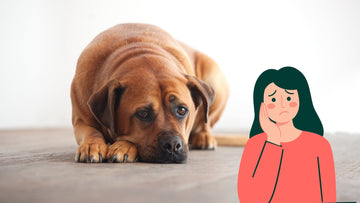Do you have a dog who is not eating their food properly, or not eating at all? Decreased appetite (hyporexia), or loss of appetite (anorexia) in dogs can be stressful for pet parents, and can often indicate an underlying medical condition. If your dog isn’t eating for more than 24 hours then it should not be ignored, as it is often a warning that something else is going on.
There are a variety of reasons for loss of appetite in dogs. It's important to determine the cause in order to design the best treatment plan.
Reasons Why Dogs Won’t Eat
There can be various reasons why a dog won’t eat including –
1) Illness –
A decreased appetite in dogs is often a sign of illness, especially if your dog is showing other symptoms at the same time. Although a loss of appetite in dogs doesn’t necessarily indicate serious disease, prompt veterinary attention is important because it could be a sign of significant illness, including cancer, various systemic infections, pain, liver problems, and kidney failure.
The list of possible medical causes for dog anorexia or hyporexia is very long and can include:
- Dental disease
- Oral pain
- Nausea
- Vomiting
- Diarrhea
- Intestinal parasites
- Pancreatitis
- Stomach upset (eating table scraps or something else they shouldn’t have, or a sudden change in food or treats)
- Infection
- Fever
- Cancer
- Liver disease
- Kidney disease
- Inflammatory bowel disease
- Congestive heart failure
- Lung disease
2) Vaccination –
Though vaccination is done to protect the dog from serious health issues, it can sometimes have negative effects on the dog’s appetite. The loss of appetite in dogs due to vaccination is often temporary and can be cured with time. But if your dog is not eating for more than 48 hours, then there is something else to worry about. Seeking veterinary assistance in such cases is recommended.
3) Travel and unfamiliar surroundings –
If your dog’s appetite was fine until you went on a trip with them or moved to a new location, it may be that your dog won’t eat because of traveling or the unfamiliar surroundings. Some animals may get motion sickness, and others become nervous or uncomfortable in new places.
4) Pickiness or behavior issues -
Majority of us thinks that our dog is a picky eater if he/she rejects food often. But there could be other reasons for this. Some dogs are just picky, or their refusal to eat may be caused by feeding them in situations where they aren’t comfortable, such as around an aggressive dog or from a bowl at an uncomfortable height, placing the bowl near washroom or smelly areas. Because a decreased appetite in dogs may be caused by illness, never assume that your dog is picky without investigating other possibilities first.
What you can do if your dog isn’t eating -
What you can do in this situation depends on the cause of the problem. If your dog’s loss of appetite is caused by illness, the vet may recommend a prescription diet to meet your pet’s nutritional needs.
If your dog’s decreased appetite is a behavior problem caused by pickiness or a discomfort with mealtime, rather than the result of a medical condition, there are a few things you can do to encourage your pet to eat.
- Taking your dog for a walk before mealtime.
- Cutting back on treats.
- Using a treat dispenser toy, that dispenses food.
- Rewarding your dog with food for doing a trick.
- Feeding your pet on the same time daily.
- Changing your dog’s feeding situation. If you normally feed your pet with other animals, try feeding them alone. Or try using different bowls or plates at different heights to see what your dog prefers. And always serve them food away from sticky areas.
- Add a bit of warm water to your dog's food to make it more appealing.





